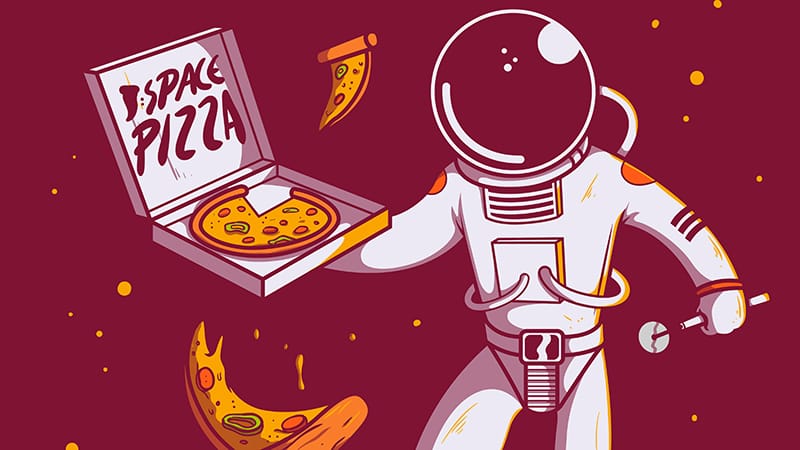Mr. Spock! Your prescription is ready!
Science fiction fans often have to suspend disbelief, despite efforts by the writers to explain why their ships can travel across the galaxy as fast as we can travel across town, and why their crew can talk to alien humanoids almost immediately upon first contact, and encounter alien vessels in the almost unimaginable vastness of space. It’s like when you tell someone that you’re from Virginia originally and someone asks you if you know their aunt. What’s more, no matter how many galaxies away we find them, the aliens are almost all humanoids who communicate by making sounds that we can hear and reproduce.
Science Fiction as Social Commentary
These issues repeat themselves all over the science fiction genre, from the writing of Samuel R. Delany, Isaac Asimov, and Ray Bradbury to the so-called space operas like Star Trek and Star Wars. For myself, I don’t think it’s rational to expect that the earth is the only planet in the universe with life on it, especially given the extreme conditions where life exists here. The sheer amount of real estate out there for life to develop on is unimaginable. But Vulcans?
What about them? Wasn’t Spock a brilliant creation? Star Trek and The Orville, Seth MacFarlane’s delightful parody of Star Trek, are both plot-driven examinations of contemporary political themes, but The Orville does it with a lot more humor. The Orville and Star Trek both present the future as a good place where people are better off and there is no war or want on earth. People don’t even need money in order to survive. Or, as Seth MacFarlane puts it:
It’s a balancing act between wanting to explore conflicts that are relevant to today while at the same time saying to the viewer, This particular conflict has been resolved. The way you do that is by putting our people in other worlds. You go to that alien planet where they’re still sucking oil out of the ground to power themselves while “we” know we moved beyond that. I always loved that sci-fi trope of the future person scratching their head in disbelief at something that we do every day in the twenty-first century.
On The Orville, there is an alien couple with one man and one trans man, the chief medical officer is a black woman who chose to be a single mother, and the chief of security is a young alien woman with superhuman strength. One of the officers is a blob of gelatin. At no time do they all look around and say, “Wow, we sure are a diverse crew, aren’t we?” They just are, and it’s the status quo. People mock Star Trek: TOS today, but it took guts to put a Russian, a black woman, and an Asian man on the bridge of a starship in 1966.
Mr. Spock, Alara, Dr. Phlox, Shran, the Horta, and Yaphit (who is literally a talking ball of slime), are all people who come from different fictional planets many light-years away. We’d be late for everything.
We all know that there are all kinds of problems with the idea of faster-than-light travel. The amount of energy required is nearly infinite, and by the time everyone got where they were going, they would find that generations had passed on earth while they hadn’t aged more than the months it took to travel to their destinations. It certainly doesn’t allow for the kinds of events that happen on the Enterprise or The Orville, because you’d still take over four years to get to Proxima b, and we don’t even know if anyone lives there.
Science Fiction and Communication
And then the problem of language is not insignificant. Even assuming that other life forms are humanoid and communicate with sounds and body language and not pheromones and emitted light, there are problems with body language, etiquette, social rank and relationships, register, good touch/bad touch, and body proximity. Even on earth, there are differences between cultures. F’rinstance, the apparently innocuous American okay symbol means something obscene in Brazil.
When a human being has a developmental disability that prevents them from recognizing social cues, it’s disastrous for their social lives even if they speak their native language in a grammatically correct way. Now we have to imagine that Amanda knew how close she was allowed to stand to Sarek, how much eye contact was socially appropriate, and how much of her body to keep covered. Also how Lt. Yaphit might have to be counseled on how to respond to rejection on The Orville.
Speaking of assholes, each earth culture and subculture has rules about where you can touch each other, whether you can or should use obscene or profane language, who can mate with or marry or have sexual relations with whom. And just because you can wear yoga pants and a T-shirt in front of your spouse and children in the house doesn’t mean you can wear it in the courtroom and you certainly can’t remove someone’s appendix dressed that way.
I’m going to digress for a minute. One of the glorious things about The Orville is its irreverence. In the Star Trek universe, aliens are almost always fonts of wisdom and they have attributes that are superior to ours—especially when they aren’t humanoids. The Horta was an acid-shooting murderous rock monster who turned out to be a mother who loved her children with operatic fierceness. The Companion was a sparkling gaseous intelligent life form who turned out to be Zefram Cochrane’s devoted lover and who sacrificed her own immortality just to be with him. Yaphit is just an asshole. The show does a brilliant job of combining comedy with the idealism of science fiction.
Science Fiction and Customs
And then imagine what would happen if some species arrived on Jonathan Archer’s Enterprise and assumed that a four-legged nonverbal animal with no thumbs was food and warmly and kindly prepared Porthos as a meal for the bridge crew as a gesture of comity and goodwill. Even assuming that everyone agrees on The Orville that everything on the menu is food (“Can I have a napkin?” is one of the best lines in all of science fiction TV)—and we can barely do that here on earth—who eats first? Do you use your hands? How much is it polite to eat? Is that really gluten? Are you supposed to eat alone with your back turned or at a table? Who sits down first? Who pays? And are you going to eat the last plum?
There are also serious problems with disease. Even if there were Andorians and Moclans and not sentient fungus or life forms that communicate by means of, say, changes in density, each species would have immunities to pathogens that the other doesn’t. Smallpox wiped out whole tribes in the New World. And one of these days, influenza is going to wipe a lot of us out. There are immunocompromised people here on earth who don’t dare catch a cold. What would the common cold do to a Gelatin?
So how do we handle this? One way is to continue doing what we’re doing. We assume that we don’t know everything there is to know about physics and that maybe someone will find a way around this space travel thing. The other way is to assume that we haven’t killed ourselves off and we’ve terraformed the entire solar system and that selection pressures on those terraformed planets have resulted in, over millions of years, humanoid species that evolved from ours. The traveling takes place within the solar system. Then there is The Martian, which sticks to what has already been invented, but puts it to use.
Science Fiction as Subversive Social Commentary
Why would we have to do this? In 1958, Judith Merril wrote:
A few years back, the physical possibility of space flight was still enough in doubt to make space travel a favorite subject for science fiction, which after all, is speculative fiction: meaning a story that answers the question, “What if…?” But in order to be science-fiction, the answer must not only be imaginative, but logically reasoned form the accepted knowledge of the day.
Right now, the unknown quantities, the “What ifs?” of space flight, are mostly either technical details (requiring at the least an engineer to know enough facts to reason or imagine from), or they arise in areas where basic scientific research has not yet broken enough ground to provide the minimum of factual knowledge (faster-than-light flight, for example).[1]
And Kingsley Amis “defined [science fiction] in New Maps of Hell (1960) as ‘that class of prose narrative treating of a situation that could not arise in the world we know, but which is hypothesized on the basis of some innovation in science or technology, or pseudo-technology, whether human or extra-terrestrial in origin.'”[2]
Science fiction has been used traditionally to address issues of political significance and to imagine a better world. Science fiction explores the natural consequences of certain developments and decisions. Sometimes it draws on new, imaginary, or developing technology, and sometimes it just makes stuff up. I’m not sure that writing it off with, “We’ll just send robots and they’ll report back” is realistic, either. And I just assume that someday, this is all going to get figured out. Unless we destroy ourselves first. God knows our music is a hell of a lot better.[3] In the meantime, science fiction has always made us think.
[1] Judith Merril, “SF: The Year’s Greatest Science Fiction and Fantasy, Third Annual Edition (1958) Introduction, in The Merril Theory of Lit’ry Criticism (Seattle: Aqueduct Press, 2016), 26. It took me half an hour to find this book, even though I don’t face my book spines inward.
[2] Ritch Calvin, “Introduction: The SF Aesthetics of Judith Merril,” in the Merril Theory of Lit’ry Criticism, 1.
[3] I think that people who turn their books spines inward for an aesthetic effect probably listen to Phillip Glass when they are feeling holiday cheer.






0 Comments